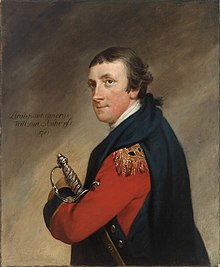William Amherst (British Army officer)
| William Amherst | |
|---|---|

Lieutenant General William Amherst
|
|
| Born |
5 March 1732 Sevenoaks, Kent, England |
| Died | 13 May 1781 (aged 49) England |
| Allegiance |
|
| Service/branch | British Army |
| Rank | Lieutenant-general |
| Battles/wars | Seven Years' War |
Lieutenant General William Amherst (5 February 1732, in Sevenoaks, Kent – 13 May 1781) was a British military commander. In 1762 during the Seven Years' War he led British forces that defeated a French expedition to Newfoundland at the Battle of Signal Hill.
Amherst was born into a family of lawyers He was the son of Jeffery Amherst and Elizabeth Kerril and his brothers included Field Marshal Lord Amherst and Admiral John Amherst.
Amherst was commissioned as an ensign in the First Regiment of Foot Guards in 1755. He eventually rose to the rank of lieutenant general in 1779. As a lieutenant colonel, Amherst was instrumental in the re-capture of St. John's from the French in 1762 at the Battle of Signal Hill.
In 1766 he became Member of Parliament for Hythe, and in 1768 he became MP for Launceston until 1774.
In 1769 he built a house in Ryde, on the Isle of Wight. He named the house and estate St John's, after his victory in Newfoundland. The neighbourhood of Ryde that surrounds the house is still known by that name.
He was appointed Adjutant-General to the Forces in 1778: he died while serving in that role in 1781.
The point of St. John's Harbour that is adjacent to Signal Hill is named "Fort Amherst", in commemoration of his great victory at Signal Hill.
...
Wikipedia
